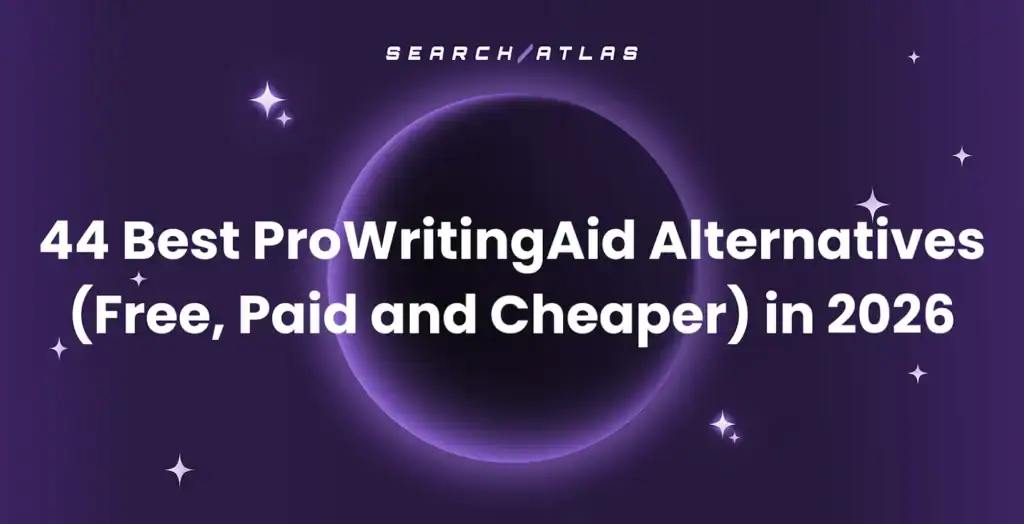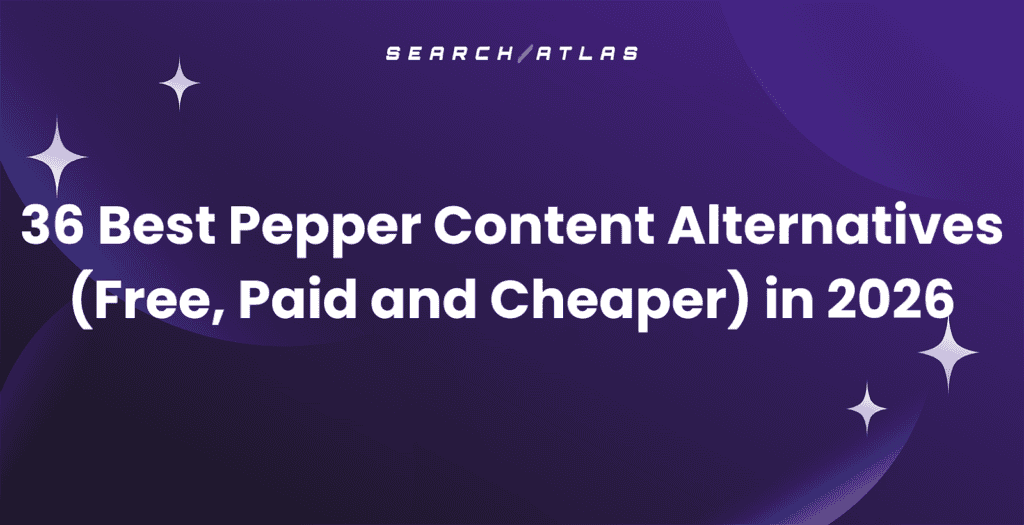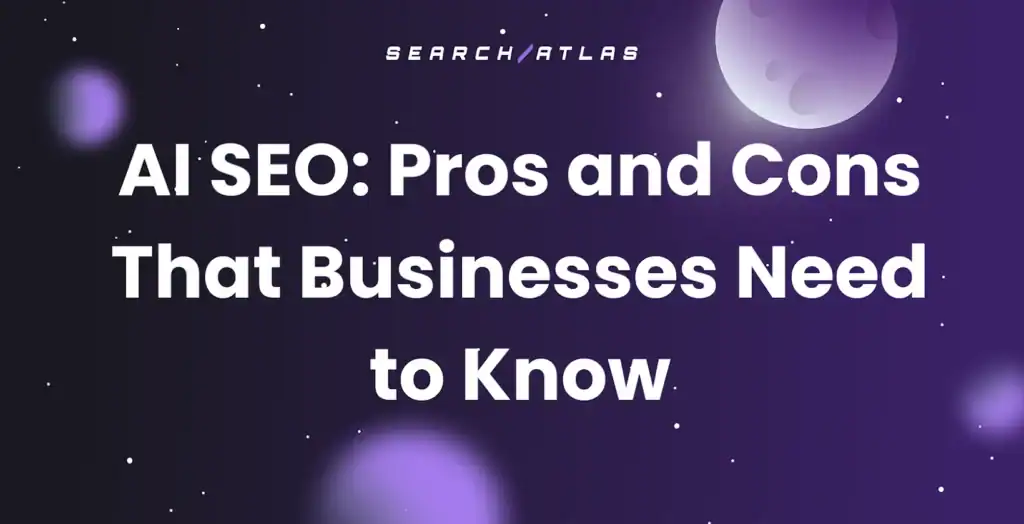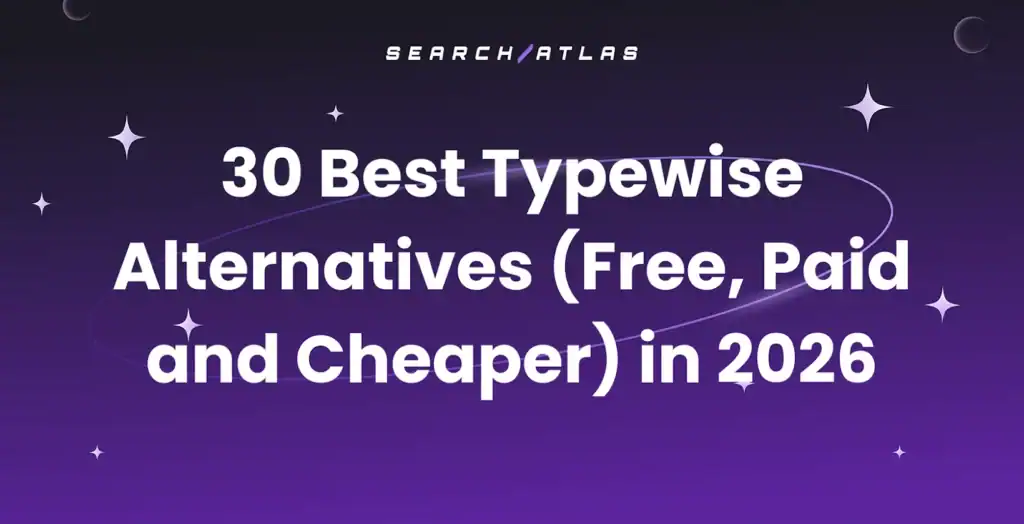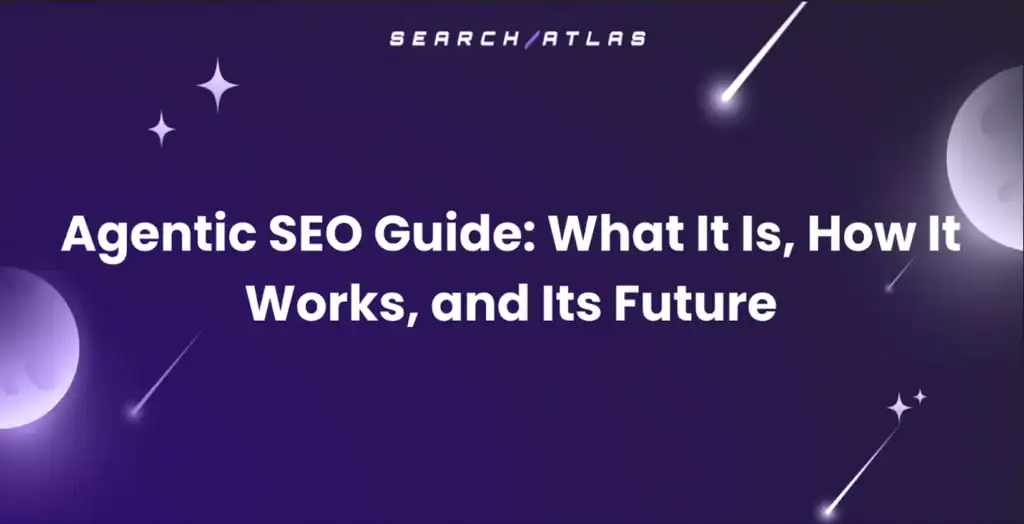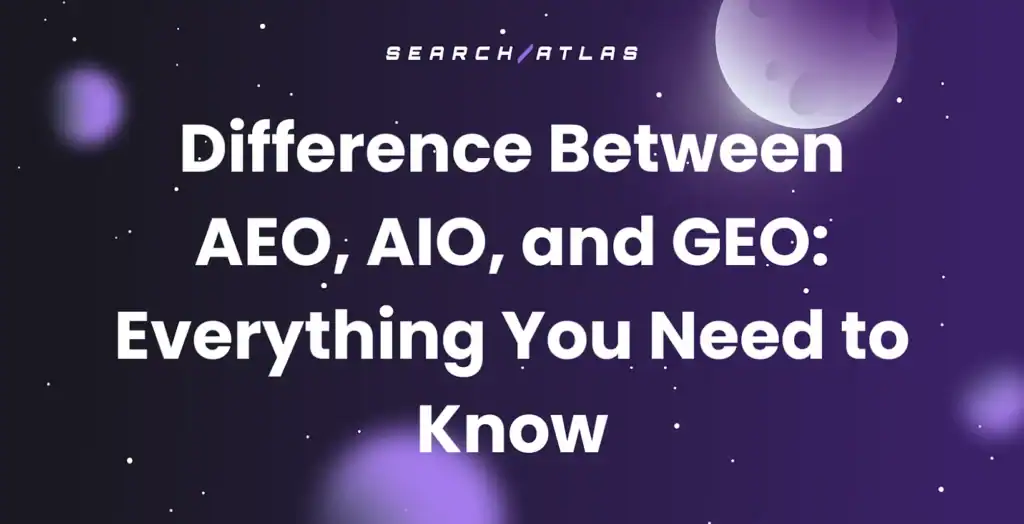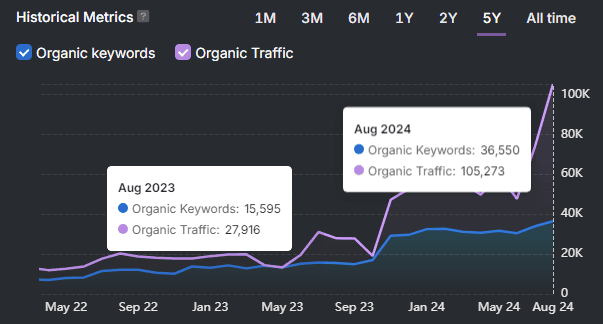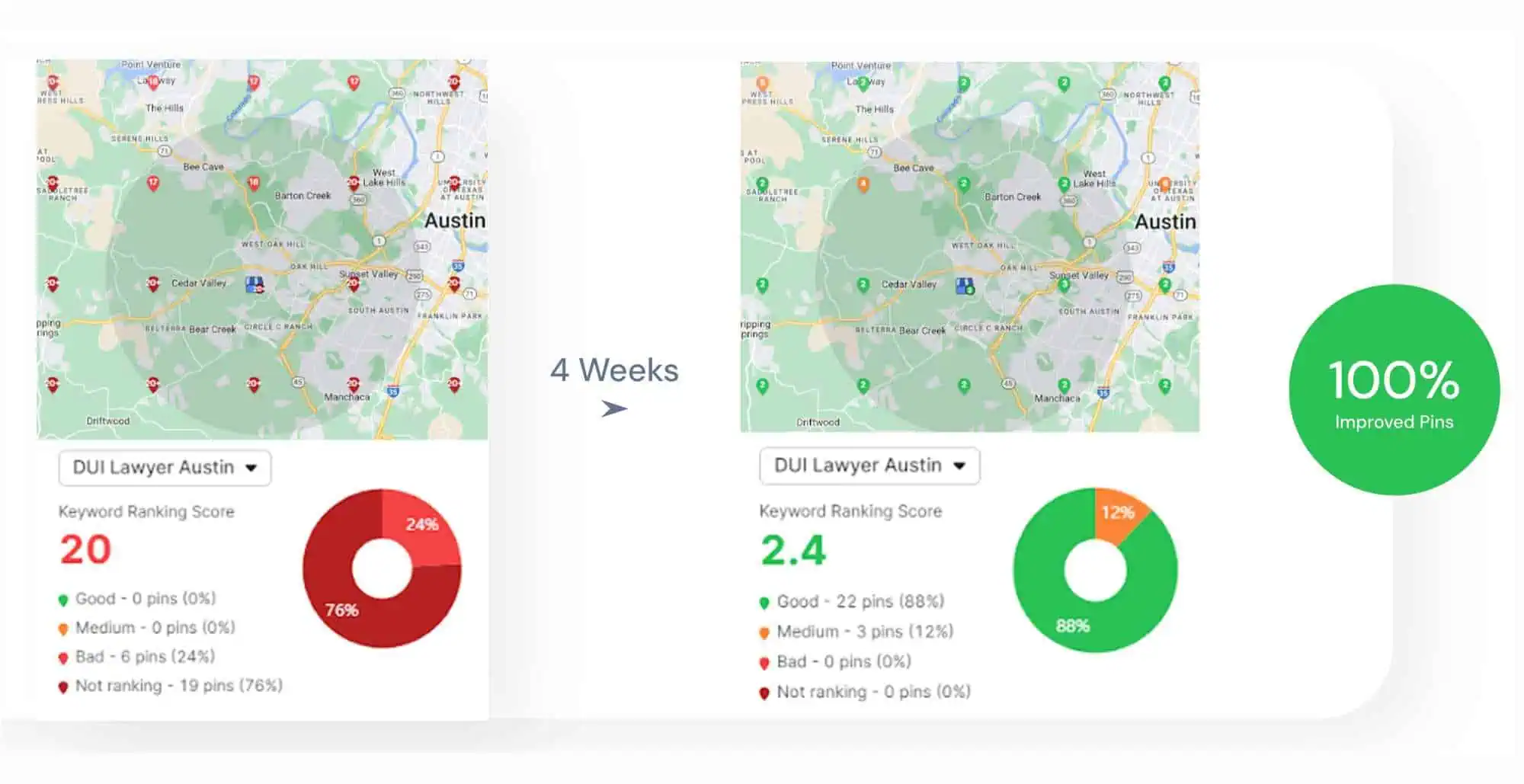AI SEO tools are software solutions that use artificial intelligence (AI) to automate and improve search engine optimization tasks. AI SEO tools apply machine learning (ML) and natural language processing (NLP) to analyze search trends, cluster keywords, generate optimized content, and run technical audits at scale. AI tools for SEO offer real-time insights that support data-backed decisions across every stage of the SEO workflow.
The integration of AI in SEO changes how websites compete in search results. SEO automation tools can identify ranking opportunities, streamline content production, and implement technical fixes faster than any manual system.
Search Atlas SEO Software and their OTTO SEO are leading paid AI SEO software built for large websites, agencies, and individuals that need fast, automated SEO execution. ChatGPT is a powerful free option that can support content drafting, prompt creation, and competitive analysis. As AI continues to shape how websites rank and grow, learning how to use AI for SEO is no longer optional.
What are AI SEO Tools?
AI SEO tools are algorithmic systems that apply artificial intelligence to search engine optimization tasks like keyword research, content creation, and website optimization, across large-scale websites, content networks, and digital assets.
AI SEO tools are designed to read, interpret, and act on search engine signals using trained models that simulate human understanding of language, structure, and topical relevance. SEO AI tools use machine learning and natural language processing to uncover ranking patterns, score content against algorithmic benchmarks, and generate optimization suggestions based on real-time SERP conditions.
Most AI SEO tools operate across three layers. The three layers are data ingestion (SERP scraping, log file analysis, keyword intent parsing), semantic modeling (entity extraction, topic clustering, vector scoring), and output automation (content generation, internal linking, technical audits). Data ingestion, semantic modeling, and output automation allow artificial intelligence SEO platforms to exceed rule-based automation and make adaptive decisions. Most AI predictions are correlational, not causal, and still depend on historical training data and static SERP snapshots.
Artificial Intelligence SEO tools constantly learn from performance data and adjust to changing search engine requirements, while traditional SEO software relies on fixed rules and manual analysis. AI SEO optimization tools process thousands of data points in seconds, spotting patterns human analysts would miss.
Modern AI SEO platforms perform multiple functions, from AI-powered keyword research and content generation to technical audits, SERP feature tracking, and ranking predictions based on competitive analysis and algorithm patterns.
What are the Benefits of Using AI for SEO?
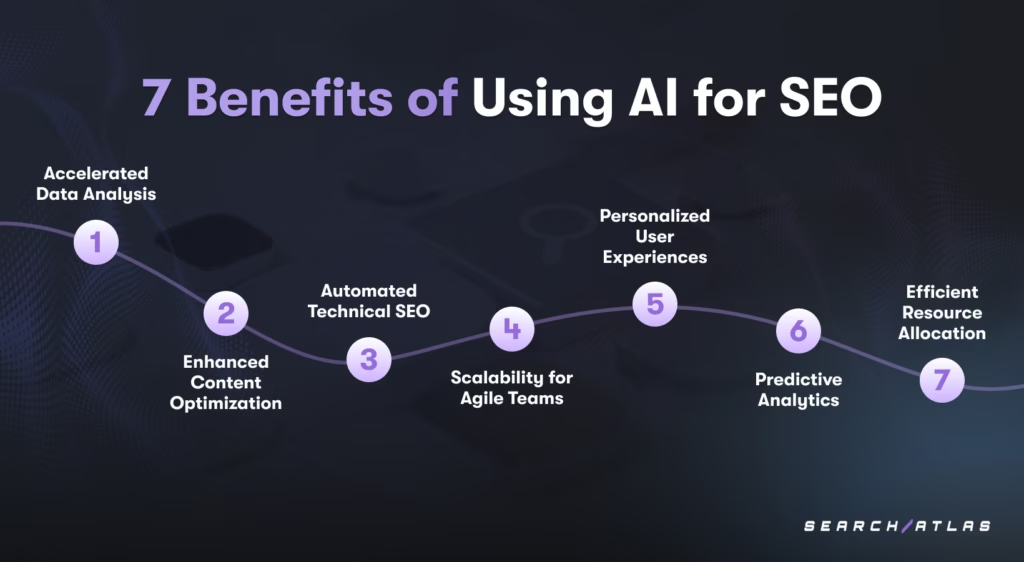
Using AI for SEO delivers real, measurable gains across speed, scale, and search visibility. Automated SEO tools help websites execute faster decisions, reduce manual errors, and adapt to algorithm changes in real time.
The 7 main benefits of using AI for SEO are listed below.
- Accelerated Data Analysis. AI tools can process huge amounts of data in milliseconds, facilitating quicker identification of trends and insights.
- Enhanced Content Optimization. AI assists in creating and refining content that aligns with user intent and search engine algorithms, improving relevance and engagement.
- Automated Technical SEO. AI can automate technical aspects of SEO, such as identifying and fixing crawl errors, optimizing site structure, and managing meta tags.
- Scalability for Agile Teams. AI SEO software facilitates scalable solutions for agile teams by allowing focus on strategic initiatives.
- Personalized User Experiences. AI-powered SEO enables personalized content and recommendations, enhancing user engagement and satisfaction.
- Predictive Analytics. AI provides predictive insights, allowing for proactive adjustments to SEO strategies based on anticipated trends.
- Efficient Resource Allocation. AI in SEO lets SEO professionals allocate resources better by automating routine tasks and focusing on high-impact activities.
What are the 21 Best AI SEO Tools to Boost Your SEO Ranking?
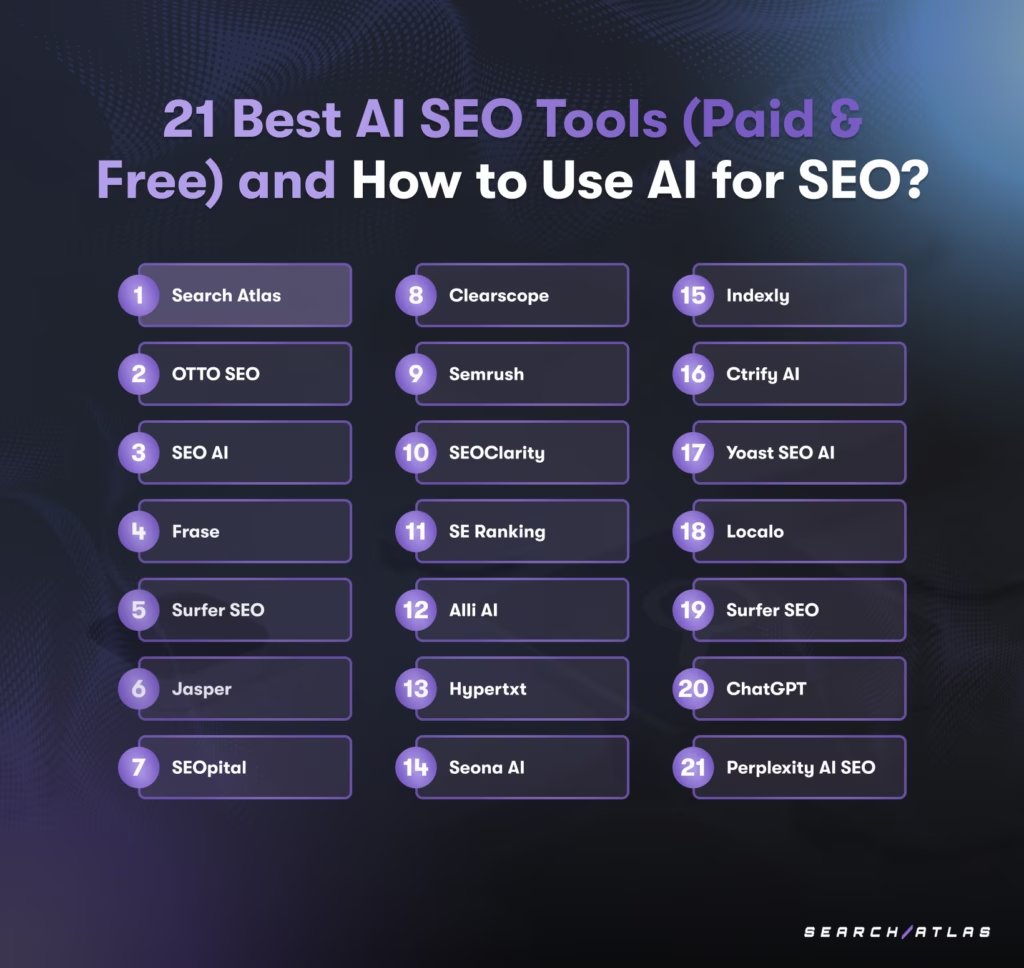
The best AI SEO tools combine automation, content intelligence, and technical optimization features into unified systems. The list of best AI SEO software platforms includes paid and free AI SEO tools trusted by agencies, SaaS teams, and growth marketers. These are currently the best AI tools for SEO, based on usability, features, and SERP impact.
The 21 best AI SEO tools to boost your SEO ranking are listed below.
1. Search Atlas
Search Atlas is an AI-powered SEO and PPC software platform designed to unify keyword research, content strategy, technical audits, link building, competitor analysis, and local SEO. The Search Atlas SEO suite delivers AI-driven automation across all SEO and PPC processes, which makes it suitable for brands, agencies, and content teams managing high volumes of pages.
The Search Atlas SEO software includes proprietary systems for content generation, semantic structuring, data-backed optimization, and competitive benchmarking, unlike tools that focus only on creating content, scoring content, or identifying issues.
The leading Search Atlas AI-supported SEO management tools are outlined below.
- Topical Map Generator. A topical authority tool that constructs content architectures using entity-based clustering. It visually maps keyword hierarchies based on semantic relationships to support topical authority development.
- Content Planner. A content tool that transforms keyword clusters into action-oriented content strategies. Connects with Content Genius and Topical Maps to streamline production workflows.
- Keyword Tools. Specialized keyword tools include the Keyword Magic Tool (cluster generator), the Keyword Gap Tool (competitor comparison), geo-targeting, intent filtering, and more. The Search Atlas SEO platform processes over 5.2 billion keywords.
- Content Genius. A Search Atlas content optimizer builds completely optimized SEO drafts from target keywords and SERP data. Features include content outlines, keyword placement, internal linking, Q&A creation, and image generation.
- SCHOLAR (Semantic Content Heuristics for Objective Language Assessment and Review). A content analysis engine that scores drafts on clarity, human effort, accuracy, intent match, content freshness, and contextual entity flow using advanced NLP models. Scores are aligned with ranking correlation metrics. Most AI SEO tools focus on generation, but few provide this objective scoring mechanism based on how Google evaluates content.
- Site Auditor. A site audit tool that runs technical diagnostics for indexation issues, CWV scores, redirect chains, schema integrity, duplicate content, and crawl depth. Compatible with custom and third-party crawlers.
- Site Explorer + Domain Power. An off-site SEO tool that combines backlink analysis and keyword visibility tracking. Domain Power (DP) is a proprietary metric sourced from Google Search Console data, immune to backlink manipulation.
- Topical Dominance. A benchmarking tool that measures a domain’s topic coverage relative to competitors. Highlights semantic gaps and under-optimized clusters to guide content expansion.
- Local SEO Tools. The local SEO toolkit includes GBP management, citation building, local keyword clustering, and rank-tracking heat maps. Designed for individual companies and agencies managing location-based clients at scale.
Search Atlas integrates with WordPress, Shopify, and other CMSs to provide end-to-end automation for modern SEO workflows. As an all-around AI SEO tool, Search Atlas offers AI-powered SEO solutions for enterprises and a White Label SEO service.
Search Atlas works best for any company (from agencies, SMBs, and enterprise brands to SEO professionals, freelancers, and small teams) in need of a centralized SEO solution that eliminates workflow fragmentation and provides enterprise-grade capabilities at mid-market pricing. The automated SEO software suits users who prefer unified dashboards over patchworking multiple tools.
Alternatives to Search Atlas, like Semrush and Ahrefs, offer similar capabilities. But the alternatives lack the unified workflow and AI-based SEO solutions that make the Search Atlas SEO Software amazing for teams who want to scale their SEO efforts, without sacrificing quality or adding complexity.
2. OTTO SEO
OTTO SEO by Search Atlas is the AI automation engine that powers much of Search Atlas’s smart functionality. OTTO SEO, as an on-site and off-site automation layer, identifies SEO issues, deploys fixes, and manages optimization tasks across on-page, technical, content, off-page, and local SEO. OTTO Google Ads, OTTO SEO’s separate module, handles automated ad campaign setup, keyword selection, and performance refinement.
OTTO SEO executes optimizations directly on the site via dynamic rendering or server-side WordPress plugin updates, unlike most automated SEO tools that only audit and suggest improvements.
OTTO SEO AI optimizes SEO elements, including title tags, meta descriptions, image alt text, canonical tags, internal linking, Open Graph/Twitter cards, schema markups, and header structure.
Automated SEO software deploys missing keywords and entities in a display:none format to improve semantic relevance using NLP and Knowledge Graphs. Content generation via OTTO includes topical maps, full articles, and AI-generated landing pages.
The AI SEO agent handles indexation through Instant Indexing and Dynamic Indexing tools that submit and track URLs across Google systems. All tasks are scheduled via Autopilot and tracked in the OTTO dashboard.
For off-page automation, OTTO SEO includes Cloud Stacks (AI-generated content hosted on authority domains), press release (PR) syndication, and the WILDFIRE system for automated 2:1 link exchanges.
OTTO’s Google Business Profile module creates and schedules GBP posts, responds to reviews, manages FAQs, and pushes data to aggregator networks.
OTTO SEO is best for agencies and brands with high-volume SEO needs, particularly those that manage hundreds of product, service, or local pages. OTTO SEO is ideal for teams with limited developer support who need an AI assistant that can audit and implement changes without CMS intervention.
There are very few true OTTO SEO alternatives in the current market. PageOptimizer Pro and Alli AI offer partial automation but still require manual deployment for most fixes. Surfer SEO integrates with content editors but lacks technical and off-page automation. JetOctopus focuses more on crawl budget and data analytics, not on fixed deployment. OTTO SEO’s ability to identify and fix SEO issues with a single click, at scale, without breaking site architecture, makes it the best automated SEO tool currently on the market.
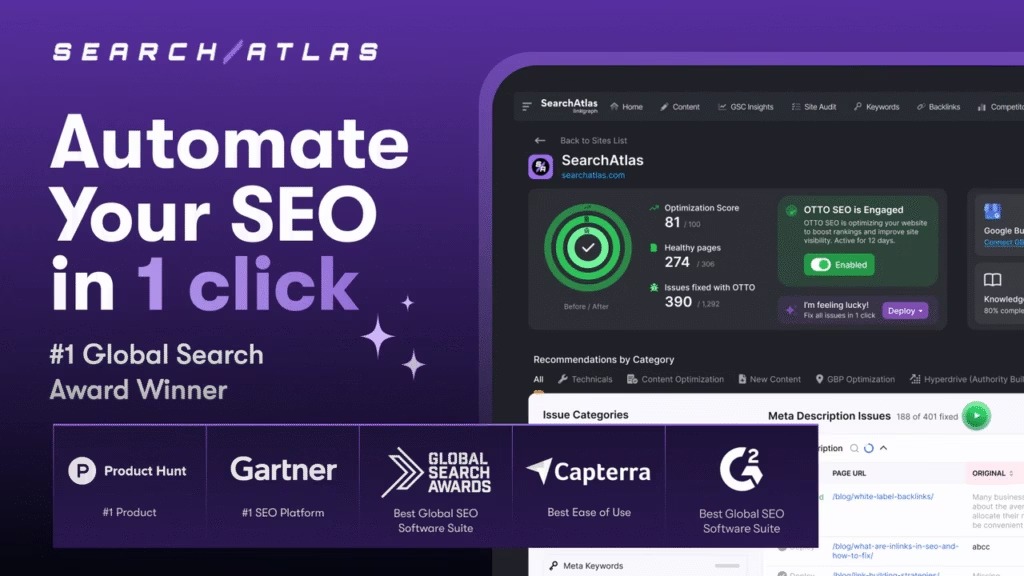
3. SEO.AI
SEO.ai is an AI content platform that automates SEO writing and optimization tasks across websites and product feeds. SEO.ai focuses on fast content generation, inline optimization suggestions, and real-time scoring for keyword alignment, structure, and semantic coverage.
SEO.ai supports multilingual output, integrates with Google Search Console and Merchant Center, and includes AI features for internal linking, meta tag generation, and feed enhancement. Its product feed optimizer edits product titles, descriptions, and attributes to match query intent in Free Listings and Google Shopping.
SEO.ai includes an AI content detection tool called AI Content Detector to assess whether content reads as human-written or machine-generated.
Teams can apply bulk content edits, generate descriptions, and train the platform to match a consistent writing style. But while SEO.ai prioritizes automation and speed, its clustering and entity modeling remain shallow compared to systems built around knowledge graphs or topical maps.
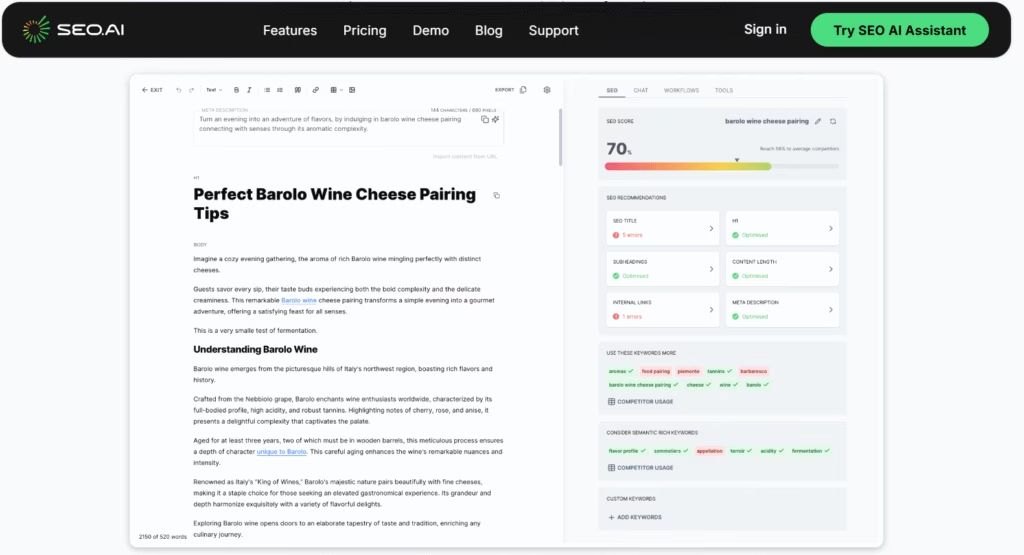
SEO.ai is most useful for content teams that manage ecommerce catalogs, write high volumes of blog posts, or operate in multiple languages. SEO.ai works best when fast turnaround is more important than detailed semantic structuring.
The closest alternative to SEO.ai is the Search Atlas with the Content Genius Tool, which offers SERP-based outlines, NLP-driven optimization, and one-click publishing in a more structured editorial workflow. Other comparable tools include Frase for brief-based content workflows, NeuronWriter for NLP keyword tuning, and Jasper for guided writing that adapts to brand tone.
4. Frase
Frase is an AI writing and content research tool that focuses on brief generation, question mining, and SERP-based optimization. Frase is designed to support content writers in the early stages of SEO production, such as topic ideation, competitor comparison, and outline creation.
Frase’s core functionality revolves around its content brief builder. Users input a keyword, and Frase scans the top-ranking pages to generate outlines, headers, FAQs, and related questions. The platform highlights which keywords competitors are targeting and where gaps exist.
Frase includes an AI writer and “Frase Answers” for turning site content into chatbot-style Q&A modules, though this feature is rarely core to SEO use cases.
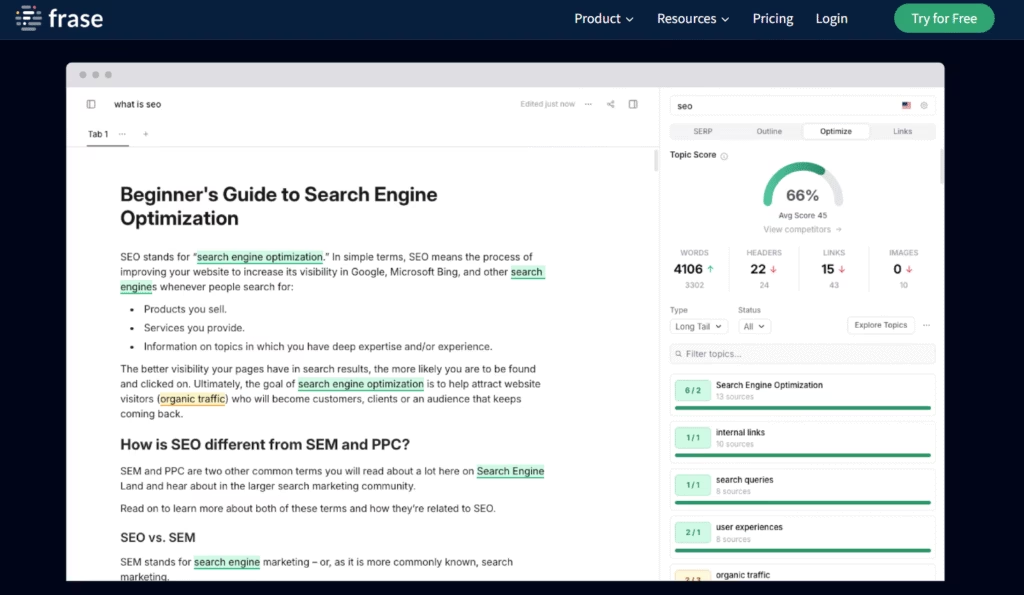
Frase is commonly used by solo SEO writers, freelance bloggers, and small agencies who need fast keyword-to-outline workflows. Frase works well for informational blog content and brief production. It is less suited for technical SEO or automated implementation tasks.
As an alternative to Frase, the Search Atlas Content Genius Tool covers the same SERP-based outline generation and exceeds it by integrating NLP term placement, Q&A creation, internal linking, and auto-publishing. In the case of Frase vs Surfer SEO, Surfer SEO wins as a better fit for larger teams. NeuronWriter outruns Frase in NLP optimization.
Frase remains lightweight and easy to use but lacks the breadth of automation offered by all-in-one AI SEO platforms like Search Atlas.
5. Surfer SEO
Surfer SEO is an AI content optimization platform that analyzes top-ranking pages to extract correlation data across on-page elements. Surfer SEO evaluates keyword frequency, content length, semantic term usage, and header structure to generate actionable content guidelines. The platform’s core feature, Content Editor, scores drafts in real-time based on alignment with SERP leaders, which helps users match observed ranking signals.
Surfer SEO offers Surfer AI for generating articles, Content Audit for reviewing existing pages, and Topical Maps for basic content planning. Supplementary tools include an AI Outline Generator, AI Detector, AI Humanizer, and the Keyword Surfer browser extension, which delivers keyword data directly from Google search results.
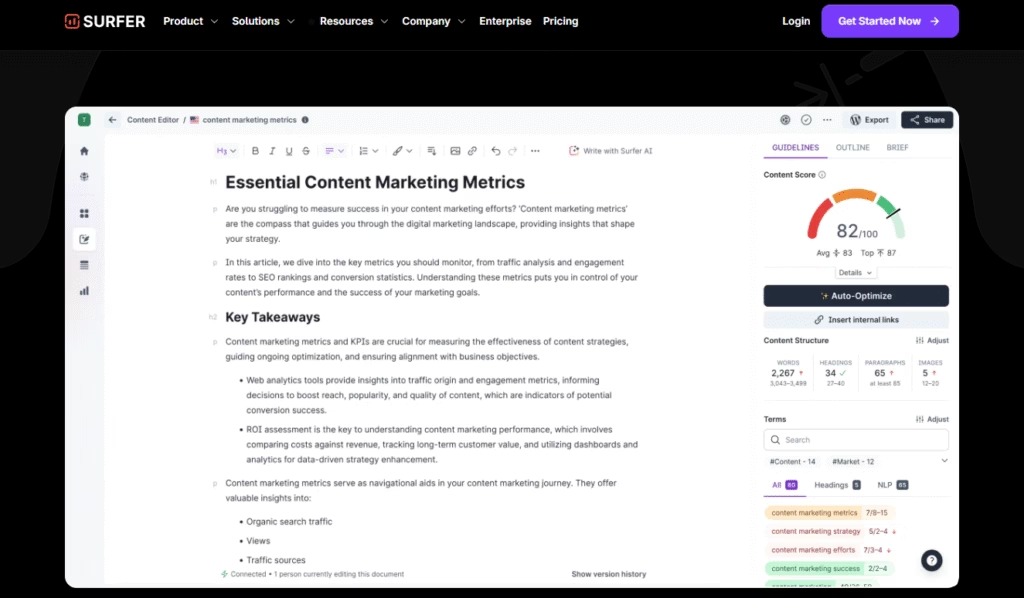
Surfer SEP’s NLP engine identifies common terms and topical gaps and offers keyword suggestions based on SERP context. However, the tool does not support schema markup deployment, indexation control, or automated technical SEO fixes. Users must implement changes manually through their CMS or content editor.
Surfer SEO is widely adopted by freelance SEOs, affiliate publishers, and content teams optimizing for blog-style or editorial pages. Surfer SEO is suitable for those who prefer visual scoring and hands-on workflows, but the tool falls short for teams that need full-stack automation or structured semantic control.
PageOptimizer Pro, which focuses on multiple languages and granular technical adjustments, and Frase, which supports content brief creation and SERP research, are possible alternatives to Surfer SEO. Teams looking for integrated optimization, internal linking, and semantic topic mapping in a single system prefer Search Atlas as a more automation-ready alternative.
6. Jasper
Jasper is an AI content generation platform designed to streamline writing tasks for marketing, blogging, and SEO. Jasper uses large language models (LLMs) to power long-form content creation, brand voice consistency, and campaign asset generation. While Jasper includes SEO-oriented templates, its core strength is AI-assisted writing, not search-specific optimization.
The main Jasper features include workflows for marketing teams, tone-of-voice controls, multi-language support, and template libraries for emails, ads, product descriptions, and more. The platform offers Jasper Chat, a GPT-like interface for real-time content assistance, and browser extensions that support in-platform editing across Google Docs, WordPress, and social platforms.
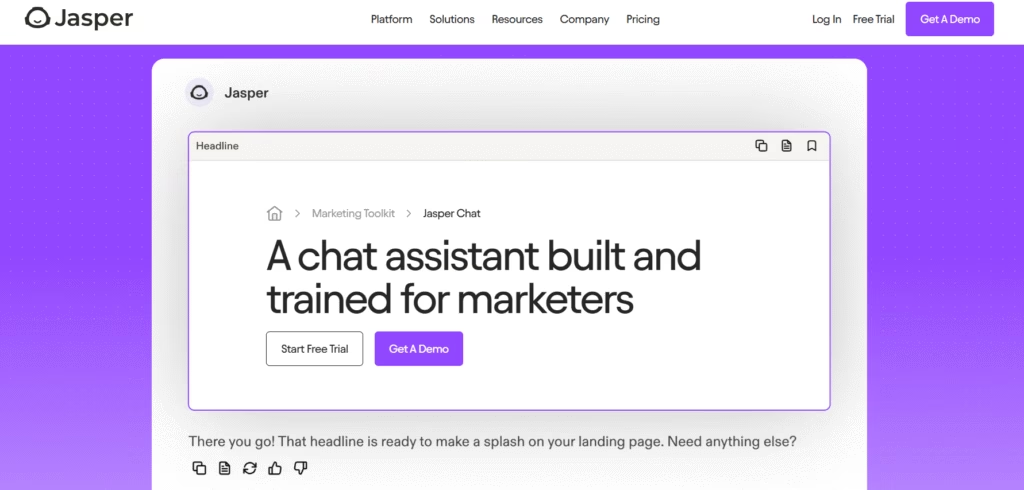
Jasper integrates with Surfer SEO for content scoring but doesn’t include native tools for keyword clustering, schema markup, internal linking, or technical audits. Jasper’s SEO capabilities depend on external tools and user prompts. Users can guide Jasper with custom instructions and brand voice settings, but optimization recommendations are not data-backed by search engine behavior or ranking analysis.
Jasper is best for marketing teams, agencies, and freelancers that create high-volume branded content across platforms. It’s often used for ideation, ad copy, and product descriptions, but lacks the SEO-specific depth required for topical authority or full on-page optimization.
Alternatives to Jasper include Copy.ai for guided AI copywriting workflows, Writesonic for multi-language marketing content, and Frase for combining AI writing with content research and brief generation. These Jasper alternatives support fast content production but differ in how they handle structure, tone, and output control.
7. SEOpital
SEOpital is an AI SEO writing tool that generates and optimizes long-form content based on SERP analysis. SEOpital scans the top 10 ranking pages for a keyword and identifies structural signals. The structural signals include word count, heading use, keyword frequency, image count, and presence of FAQs. Based on this input, SEOpital either generates new content that aligns with the identified patterns or rewrites existing content to improve its ranking potential.
SEOpital includes keyword clustering by intent, internal linking suggestions, and a built-in duplication checker. This SEO AI agent supports multiple languages and offers basic GSC integration for performance tracking. Articles can be up to 5,000 words long, and users can generate AI-powered images directly in the editor.
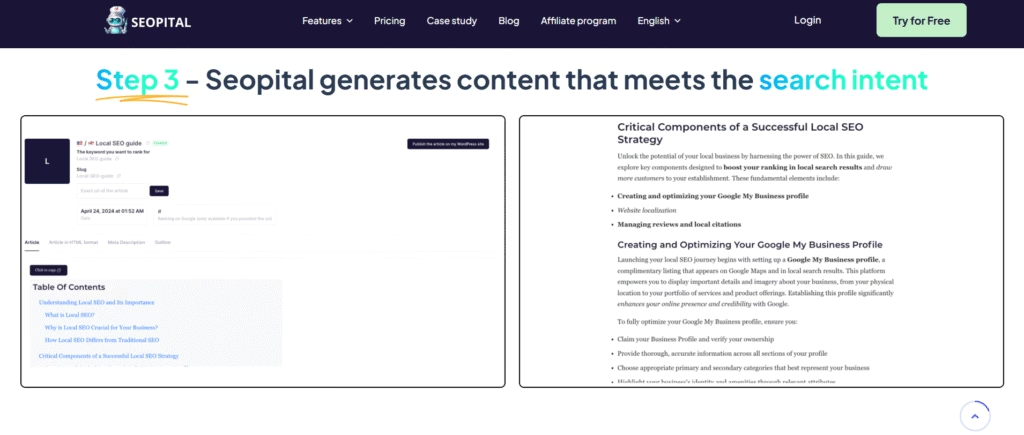
SEOpital is best for SEO teams, content agencies, and SaaS blogs that produce content at scale with limited editorial bandwidth. The tool is useful when the priority is structural accuracy and SERP mimicry over tone customization or branded storytelling.
Alternatives to SEOpital include Search Atlas for deeper topical modeling and internal link sculpting, Frase for brief-building and query analysis, SEO.ai for enterprise workflows, and Surfer SEO for NLP-based scoring and content guidelines.
8. Clearscope
Clearscope is an AI-driven content optimization platform focused on topical relevance and semantic depth. Clearscope analyzes high-ranking pages for a given keyword, extracts term frequency patterns, and provides a content grade that reflects how well a draft aligns with SERP expectations. The platform’s core value is surfacing terms and concepts that signal expertise and search intent match, without forcing keyword repetition.
Writers work within Clearscope’s live editor or integrate it into Google Docs and WordPress. The tool doesn’t generate content, it refines it. Users receive real-time feedback on content length, readability, and semantic coverage, which makes it easier to hit ranking benchmarks and keep control over tone and structure. Clearscope supports topic discovery by giving teams direction on which subjects to target based on current search demand.
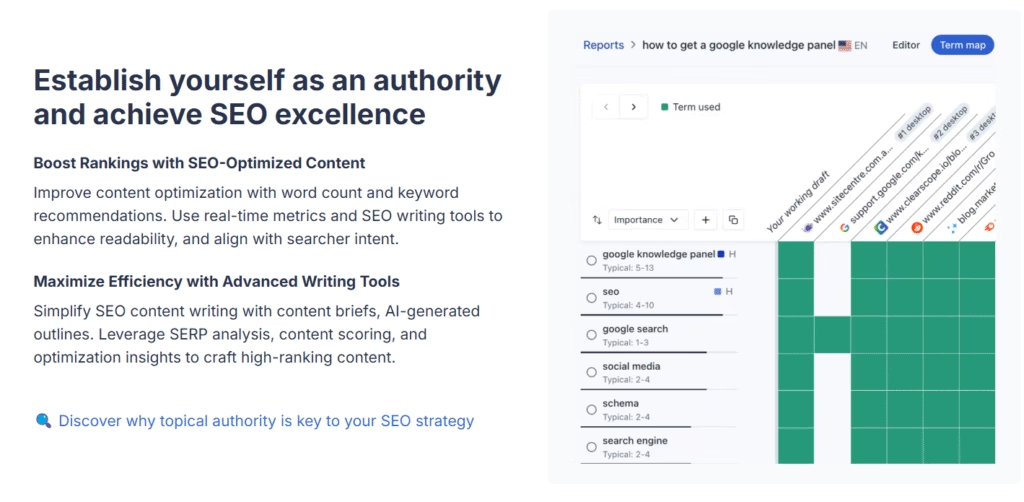
Clearscope is best for editorial teams, content managers, and enterprise marketing teams where consistency, depth, and performance monitoring are a concern. The tool works well in environments with distributed teams or review-heavy workflows, where clear optimization feedback helps speed up approval cycles.
Alternatives to Clearscope include Surfer SEO for real-time content generation with NLP scoring, MarketMuse for predictive content planning and inventory audits, and Frase for faster draft creation and brief building.
Search Atlas stands out as one of the best Clearscope alternatives for teams focused on semantic SEO and topical authority. SA bests Clearscope with tools like the Topical Dominance Tool, Topical Map Generator Tool, and SCHOLAR – an AI system that evaluates content clarity, factual accuracy, and information gain using structured semantic models aligned with Google’s ranking systems.
9. Semrush
Semrush is an SEO and marketing suite that integrates keyword research, content optimization, technical audits, PPC analysis, and competitor tracking into a single platform. Semrush is built for teams managing visibility in organic and paid channels.
Semrush includes tools for SEO, content marketing, market research, advertising, social media, agency solutions, and local marketing. Some of the platform’s modules, like the SEO Writing Assistant and Topic Research Tool, apply AI to assist with content optimization and idea generation. These modules guide users on keyword use, readability, and tone based on SERP competitor data.
Semrush is best for cross-functional marketing teams and agencies that need insight into every aspect of digital performance. Semrush is built around research and reporting. It helps users discover ranking opportunities, track performance, and benchmark competitors.
But Semrush does not automate implementation. You must handle content updates, schema adjustments, and technical fixes outside the tool.
Alternatives to Semrush include Ahrefs for deeper backlink data, Surfer SEO for on-page NLP optimization, Frase for brief-based writing workflows, and Search Atlas. In the Search Atlas vs Semrush comparison, Search Atlas includes most of the same research capabilities as Semrush but adds OTTO SEO, an AI automation layer that applies optimizations directly.
OTTO modifies SEO elements without manual input. OTTO SEO moves the workflow from insight into execution, which separates Search Atlas from AI tools focused only on scoring or suggestions.
10. SEOClarity
SEOClarity is an enterprise SEO platform that supports keyword tracking, technical audits, content optimization, and site analytics. SEOClarity uses its Clarity Grid engine to analyze large-scale SEO data and surface patterns in crawl activity, ranking behavior, and site performance. SEOClarity enables daily rank tracking, custom segmentation, and data filtering across international and multi-site setups.
SEOClarity includes Content Fusion, an NLP-based content tool that provides keyword suggestions and topic structure based on SERP analysis. The platform supports site auditing with a built-in crawler and log file analyzer. SEOClarity offers internal link clustering, schema markup tools, and basic on-page editing features.
SEOClarity emphasizes data visibility and strategic insight but leaves the execution to the user’s team or external systems.
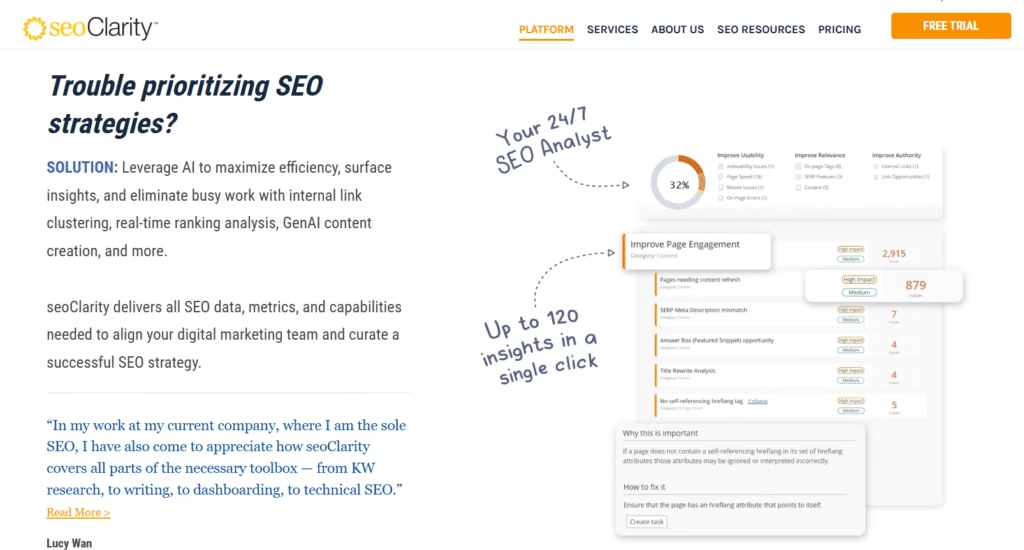
SEOClarity works best for enterprise teams that manage multi-site architectures, require granular segmentation, or need operational SEO data aligned across departments. SEOClarity’s system supports organizations where strategy, reporting, and diagnostics are managed in-house, and execution is handled by developers or external tools.
Alternatives to SEOClarity include BrightEdge for integrated SEO and content measurement, Botify for crawl budget and log-based optimization, and Conductor for content-led search workflows. Search Atlas is another great alternative to SEOClarity for enterprise teams that prioritize automation, direct implementation, and simplified reporting.
11. SE Ranking
SE Ranking is an all-in-one SEO platform built for teams that need keyword tracking, technical audits, and competitor monitoring. SE Ranking includes rank tracking with daily updates, backlink analysis, site health checks, and reporting tools for multiple projects. Users can group keywords by intent, track visibility across regions, and monitor changes in competitor strategy.
SE Ranking includes an AI-powered Content Editor that helps users create optimized blog posts and landing pages based on top-ranking SERPs. The On-Page SEO Checker scores pages against 90+ factors, including content structure, keyword use, and technical elements like load speed and metadata. Users can track historical changes in rankings and audit issues over time using built-in crawlers and content revision tools.
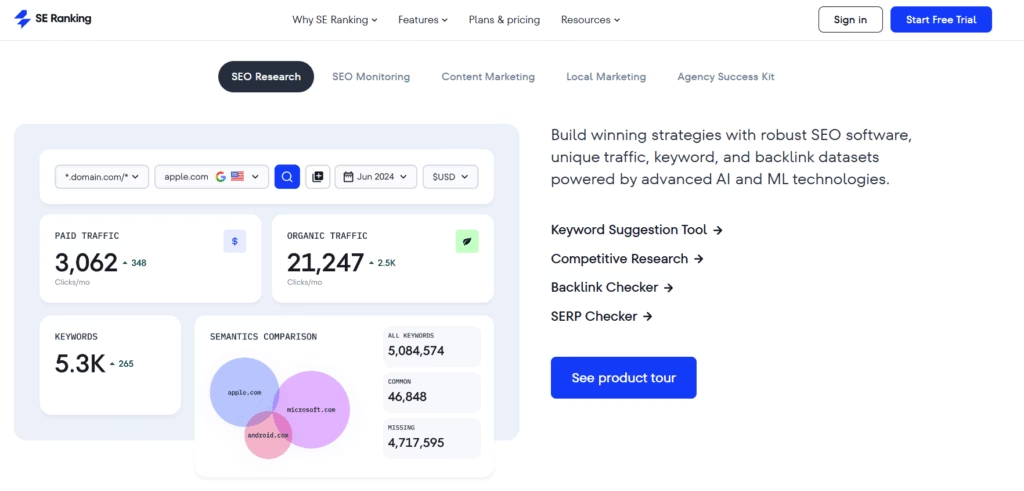
SE Ranking works best for small to mid-sized teams that want a flexible, affordable platform to manage multiple clients or internal websites. SE Ranking fits agencies that handle reporting, audits, and content optimization without the need for deep customization or automation layers.
Semrush, Ahrefs, and Moz Pro are 3 of the best alternatives to SE Ranking. Semrush works better for deeper keyword research and multi-channel visibility, Ahrefs for backlink-first SEO workflows, and Moz Pro for simplified audits and keyword tracking.
12. Alli AI
Alli AI is an SEO AI automation platform that supports content editing, rule-based automation, real-time deployment, and scaled on-page updates. Alli AI connects to any content management system (CMS) through a single code snippet and runs independently of developer input.
Users modify text, HTML elements, schema, and internal links from a browser-based editor. Alli AI generates SEO suggestions for each page. Teams can approve or edit these suggestions and publish changes instantly. The Alli AI platform adjusts to new content or layout updates and highlights all live edits in a visual overlay.
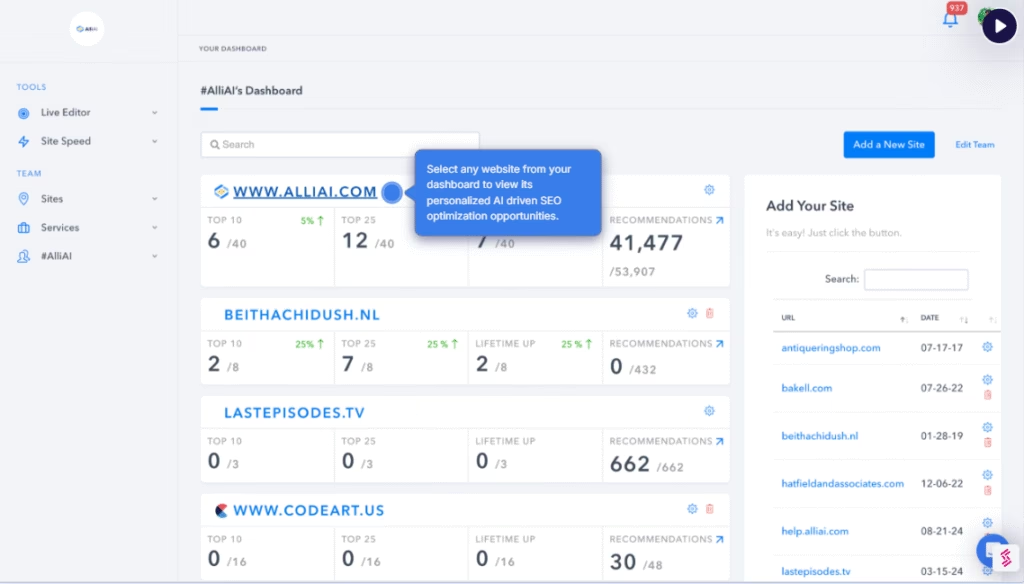
Alli AI is suited for SEO agencies, e-commerce operations, and in-house teams managing multi-page websites. This automated SEO software works well in workflows where fast changes and centralized task control are priorities.
Alternatives to Alli AI include PageOptimizer Pro for rule-based page tuning, JetOctopus for crawl and index diagnostics, and Search Atlas, which adds semantic planning, topical architecture, and OTTO SEO for automated implementation across technical and content layers.
13. Hypertxt
Hypertxt is an AI article-writing tool that supports keyword research, idea generation, research curation, and writing style customization. Hypertxt is built to generate long-form content that reflects a defined voice and covers topics in depth.
Users start by entering a keyword. Hypertxt suggests high-volume terms and related ideas. The Idea Generator then outputs a list of article angles, which can be turned into long-form blog posts with one click. The AI Writer follows the chosen structure and adapts the tone based on writing samples or templates.
A Hypertxt built-in research tool allows users to pull reference points from Reddit, Quora, and Wikipedia. The reference points add surface-level credibility but don’t replace expert analysis or structured SEO workflows.
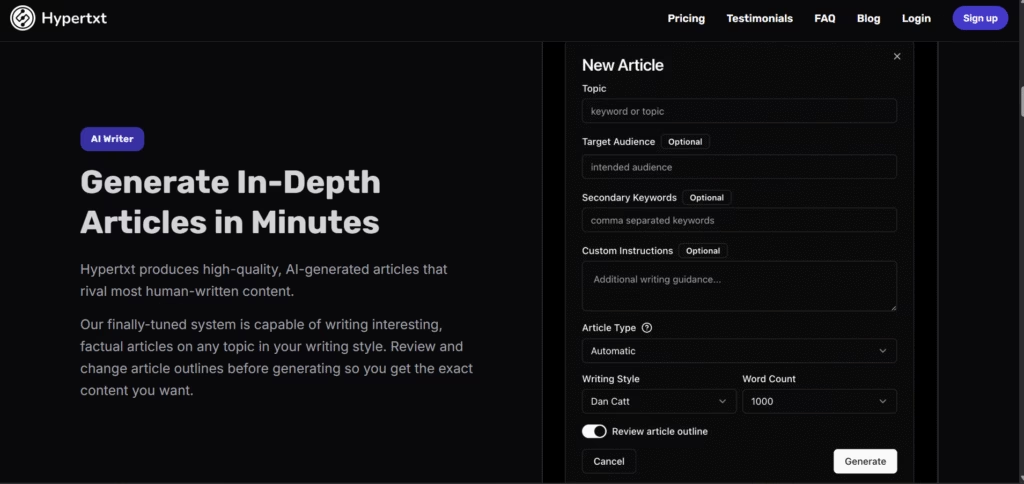
Hypertxt works best for solo bloggers, content creators, and niche site owners who want fast article generation with minimal configuration. Hypertxt suits content-first workflows that value turnaround time over technical depth.
Alternatives to Hypertxt include Frase for SERP-based content briefs, Jasper for branded tone consistency, and NeuronWriter for NLP-focused keyword optimization.
14. Seona AI
Seona AI is an AI SEO automation tool built to support keyword planning, content generation, automatic publishing, and technical SEO updates. Seona AI is designed for website owners and small teams who want to scale content production without manual SEO management.
Seona AI streamlines content creation by suggesting keywords, generating articles, and auto-publishing approved posts directly to WordPress. Users can plan weeks of content in advance, connect to Google Search Console for performance insights, and track rankings and impressions over time.
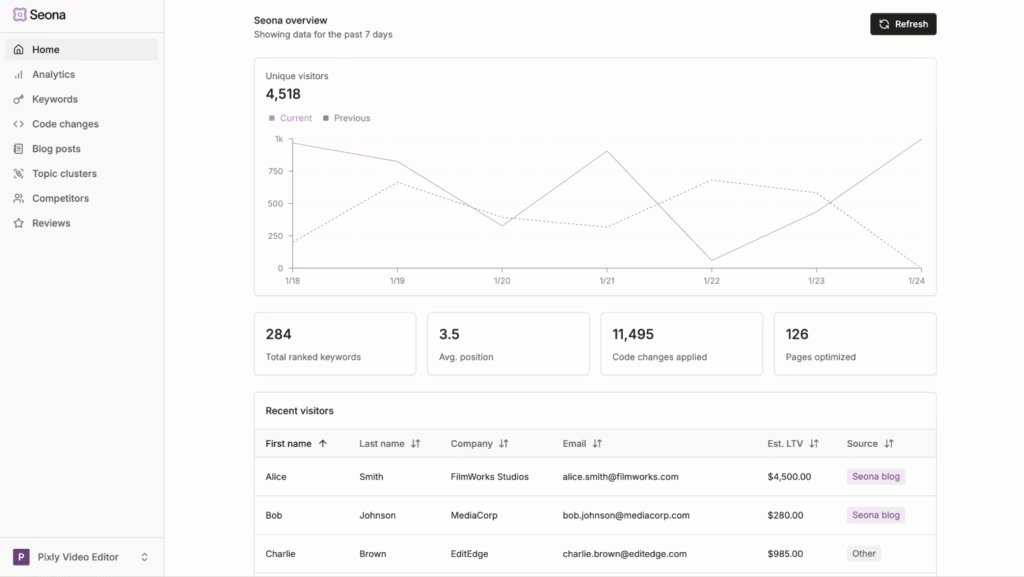
Seona works best for local SMBs, solopreneurs, and creators managing websites without SEO staff. It provides value to users who need SEO results but prefer automated assistance over advanced tooling or strategic planning.
Alternatives to Seona AI include KoalaWriter for bulk AI blog generation and low-effort topical clustering, ContentShake AI for entry-level SEO content workflows with built-in topic suggestions, and NeuronWriter for NLP-based content scoring and keyword tuning.
15. Indexly
Indexly is an AI-powered SEO indexing platform designed to automate page submission, speed up indexing, and monitor website visibility across Google, Bing, and Yandex. Indexly focuses on helping websites get discovered faster by search engines. It reduces reliance on slow crawler behavior.
Indexly connects to Google Search Console and sitemap files to detect new, updated, or unindexed pages. It automatically submits URLs through APIs like Google Indexing API and Bing IndexNow. Pages are scanned every 24 hours. Users can bulk-submit multiple URLs. The platform tracks indexing status, impressions, clicks, and search position metrics inside a built-in analytics dashboard.
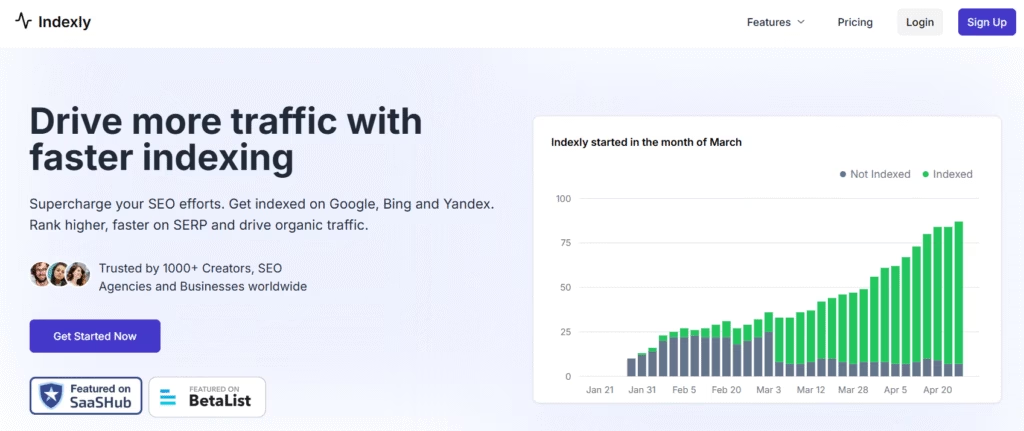
Indexly suits websites where fast indexing is critical, such as news publishers, ecommerce stores, SEO agencies, and programmatic SEO projects. Indexly is simple to install, does not require coding skills, and fits smaller teams that prioritize time-to-index over technical customization.
Alternatives to Indexly include IndexMeNow for fast manual URL submission and Foudroyer for scheduled SEO indexing tasks.
16. Ctrify AI
Ctrify AI is an SEO automation platform that combines AI-generated websites, content optimization, backlink creation, and user experience (UX) signal engineering to influence search rankings. Ctrify AI generates full websites from a keyword, creates topical authority structures, builds contextual backlinks, and runs behavioral signal campaigns to improve click-through rates (CTR), bounce rates, and dwell time.
Ctrify AI works across four main layers. The first layer is AI Website Creation, where users input a seed keyword and receive a hosted website populated with SEO-optimized articles. The second layer is Content and Internal Linking, where the platform generates topical clusters, related articles, and semantically aligned internal links. The third layer is Backlink Generation, where initial authority links are created to build Domain Rating (DR). The fourth layer is UX Signals Campaigns, where CTRify AI triggers organic behavioral signals (clicks, session durations, pogo-sticking reductions) to reinforce site quality signals under Google’s ranking models.
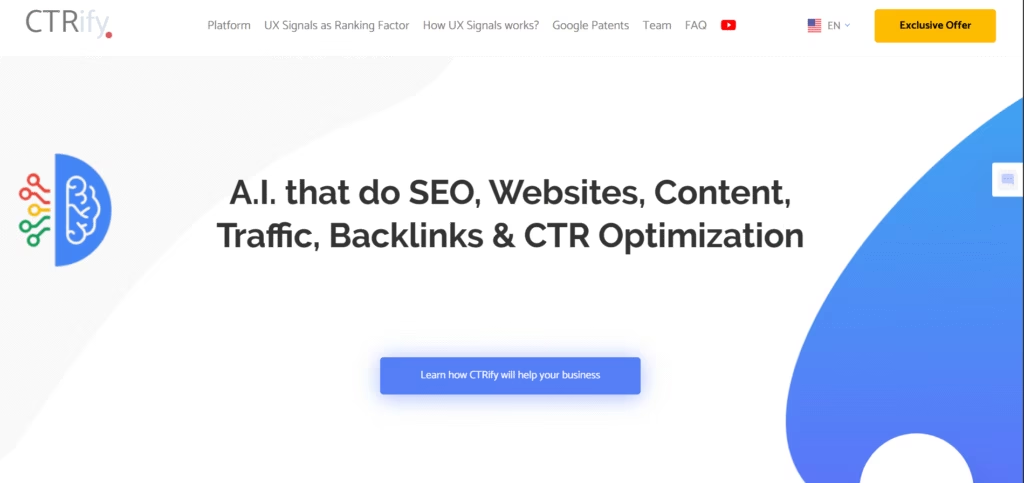
Ctrify AI works for affiliate marketers, programmatic SEOs, and solopreneurs who seek to deploy and rank SEO microsites, topical blogs, or secondary backlink sources with minimal manual input.
Alternatives to CTRify AI include Search Atlas for topical authority building, backlink automation, and AI-powered SEO execution, SEO Autopilot for automated multi-tier link building, and RankerX for link network creation and off-page SEO scaling.
17. Yoast SEO AI
Yoast SEO AI is an AI-assisted feature inside the Yoast SEO plugin that helps users create optimized meta titles and meta descriptions for WordPress pages and posts. Yoast SEO AI uses large language models (LLMs) to generate suggestions based on page content, target keywords, and SEO best practices.
Yoast SEO AI aims to save time in the meta-optimization process with context-aware, editable recommendations. Users can review, modify, and apply AI-suggested meta tags without leaving the WordPress editor. Yoast supports multilingual outputs and adapts suggestions based on custom fields, schemas, and SEO settings already configured in the Yoast plugin.
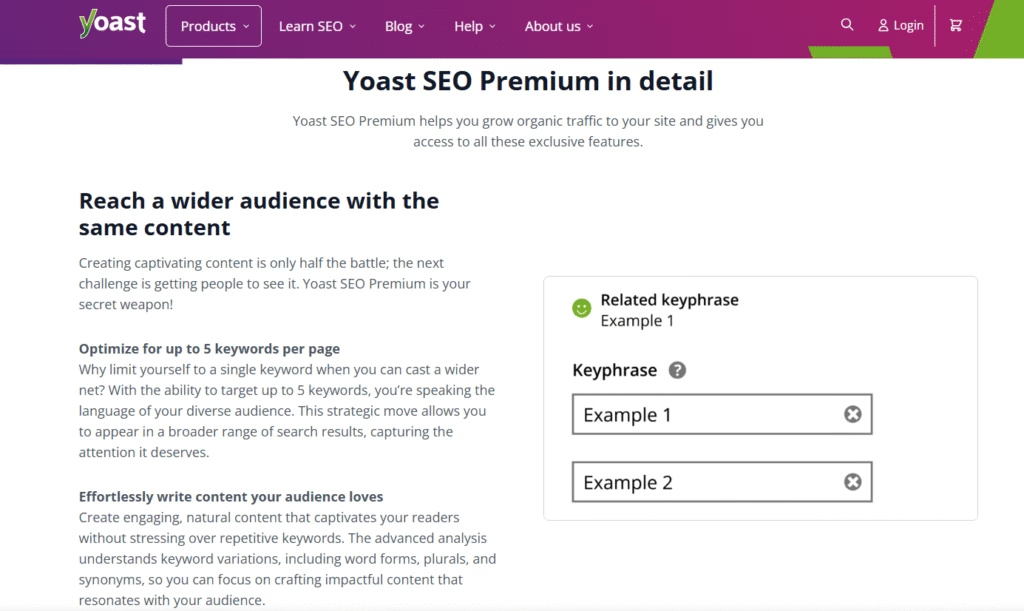
Yoast SEO works best for WordPress site owners, bloggers, and small businesses that use Yoast SEO for on-page optimization and want to automate routine meta work. Yoast SEO fits workflows focused on content visibility improvements.
Alternatives to Yoast SEO AI include Rank Math’s Content AI for on-page suggestions and meta writing, Surfer SEO’s AI integrations for content and meta optimization, and SE Ranking’s AI Content Editor for generating metadata and full SEO briefs.
18. Shopify Magic
Shopify Magic is an AI writing assistant built into Shopify’s ecommerce platform. Shopify Magic generates product descriptions, Q&A content, email content, and marketing copy based on store data, product details, and customer insights. Shopify Magic uses natural language processing (NLP) to suggest text variations that match brand tone and SEO best practices.
Shopify Magic is embedded across multiple parts of the Shopify admin dashboard. Users can create AI-assisted product listings, draft customer emails, and personalize store content without third-party apps. Additional features include background removal for product images and recommended send times for marketing emails.
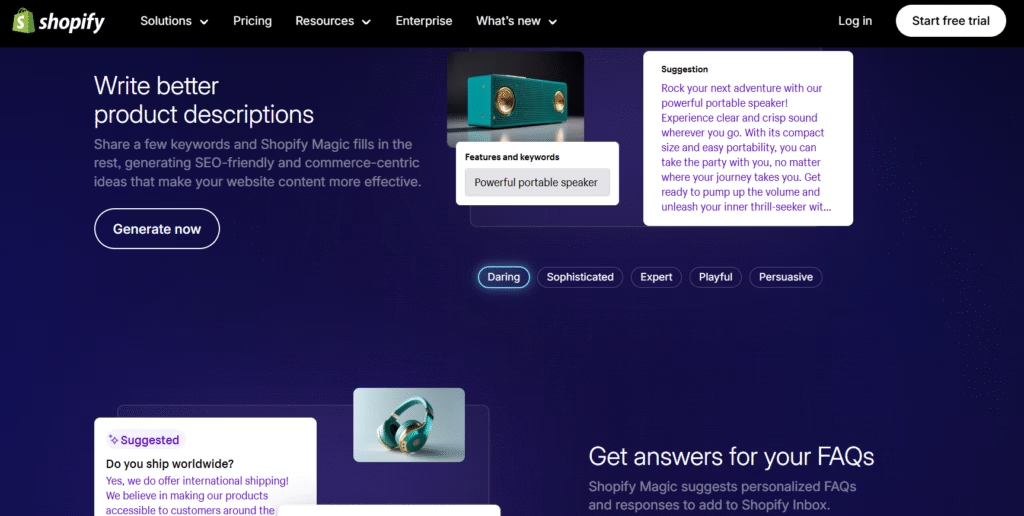
Shopify Magic is best suited for solo store owners, DTC brands, and small teams that need to quickly scale product catalog content and marketing communications inside Shopify’s ecosystem.
Alternatives to Shopify Magic include Copy.ai for ecommerce product descriptions, Jasper for branded copywriting across platforms, and Frase for SEO-focused content generation linked to ecommerce keywords.
19. Localo
Localo is a local SEO optimization tool that helps businesses improve their Google Business Profile (GBP) rankings through smart tasks, local rank tracking, AI content generation, and review management.
Users connect their GBP to Localo, where the platform audits the profile, recommends weekly improvement tasks, and monitors ranking positions across different locations. Localo AI assists with writing posts, replying to reviews, and updating profile information faster. Localo offers features like Google Business Profile protection against unauthorized changes, local post scheduling, and free one-click website generation based on GBP data.
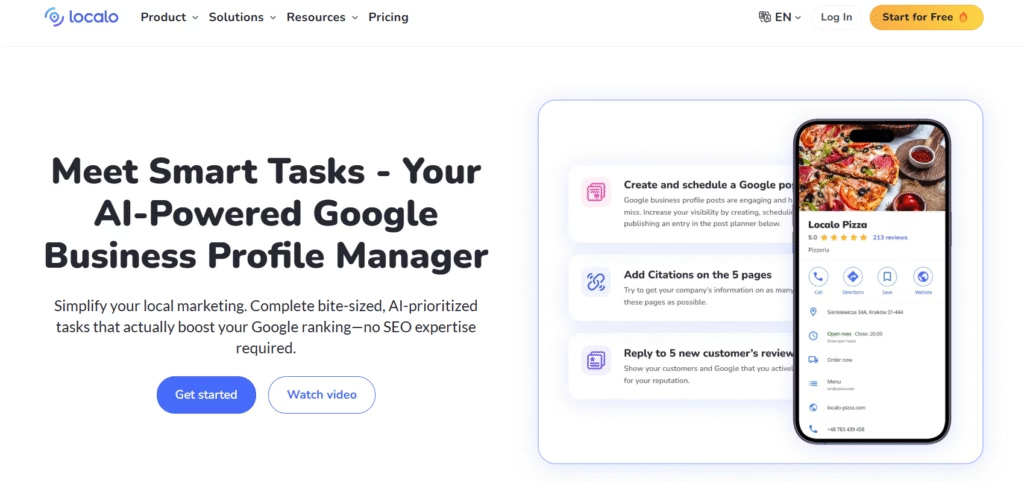
Localo works best for local businesses, freelancers, agencies managing multiple locations, and service providers that want to boost map pack rankings with minimal manual effort.
Alternatives to Localo include BrightLocal for multi-location SEO management, Whitespark for citation building and monitoring, Moz Local for centralized listing distribution, and Search Atlas for teams that need integrated Local SEO within a full-stack SEO and PPC platform.
Best Free AI SEO Tools
20. ChatGPT
ChatGPT is an AI large language model (LLM) developed by OpenAI that assists with SEO tasks like keyword ideation, content outline generation, draft writing, research, and SEO prompt creation. ChatGPT can simulate SEO workflows through custom prompts and extend its functionality with SEO-focused plugins.
Users can prompt ChatGPT to cluster keywords, generate article structures, improve readability, or simulate meta-description writing. ChatGPT Plugins like SEO CORE AI (formerly SEO GPT) expand their use into structured on-page optimization and SERP simulation tasks.
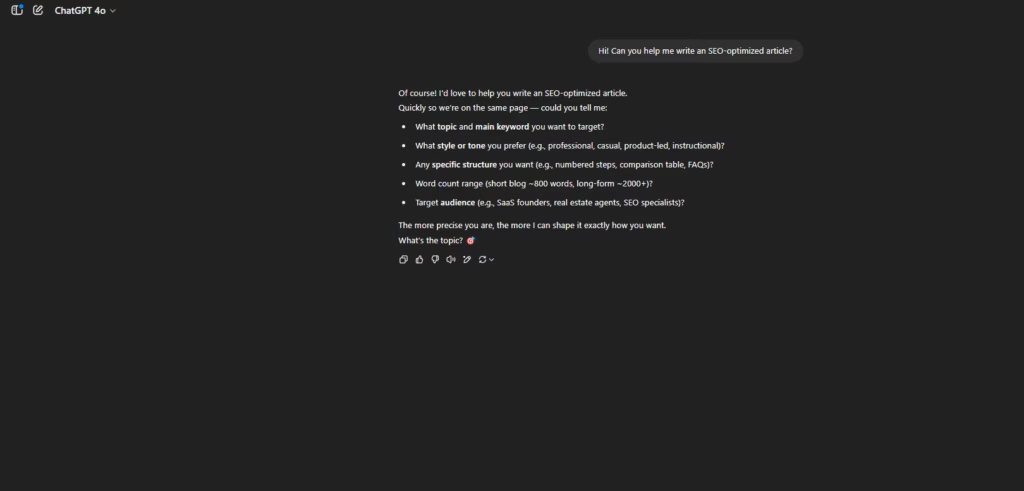
ChatGPT works best for SEO writers, strategists, and freelancers who need flexible assistance across idea generation, research support, and basic draft production. However, ChatGPT by itself lacks built-in SERP analysis, NLP optimization, or technical audit capabilities without custom workflows or plugin extensions.
Alternatives to ChatGPT include Claude for longer contextual outputs, Gemini for web-connected SEO queries, and the SEO CORE AI plugin for directly integrating SEO data and task flows inside ChatGPT.
21. Perplexity AI SEO
Perplexity AI SEO is an AI search and answer engine that supports SEO workflows by providing real-time data aggregation, citation-based research, and instant topic summaries. Perplexity AI uses live search to compile up-to-date sources and answers, which makes it useful for SEO research, trend analysis, and competitor monitoring.
Users use Perplexity AI to gather topic insights, summarize SERP competition, find current statistics, and generate content outlines based on live indexed data. Perplexity pulls from real-time sources, unlike static language models. Real-time data enhances topical freshness and citation credibility.
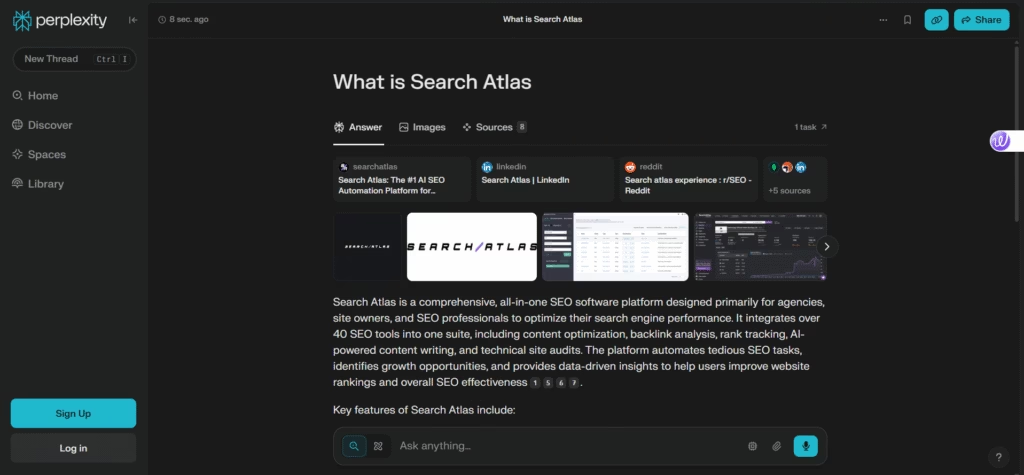
Perplexity AI works best for SEO researchers, editorial teams, and content strategists who value live validation over static, pre-trained language outputs.
Alternatives to Perplexity AI include Andi Search for citation-based fact-finding, ChatGPT with Browsing enabled for live query assistance, and Gemini for research-assisted content generation.
How to Use AI and SEO for Website Optimization?
AI and SEO for website optimization work together to automate keyword research, scale content creation, optimize on-page elements, accelerate link building, improve local SEO performance, and analyze SERP behavior.
Using AI for SEO involves applying machine learning (ML) and natural language processing (NLP) models to optimize foundational SEO areas like keyword discovery, content generation, technical audits, backlink acquisition, local profile management, and competitor analysis.
AI SEO optimization platforms identify ranking gaps, predict SERP trends, automate internal linking, detect crawl and indexation issues, and rewrite underperforming content to match algorithmic expectations.
Teams use AI SEO tools to build topical maps, deploy internal links at scale, enrich local citations, and personalize content for user intent signals.
Combining AI and SEO allows faster execution, greater precision in targeting ranking factors, and scalable workflows that continuously adapt to search engine systems.
What Elements are Foundational for SEO with AI?
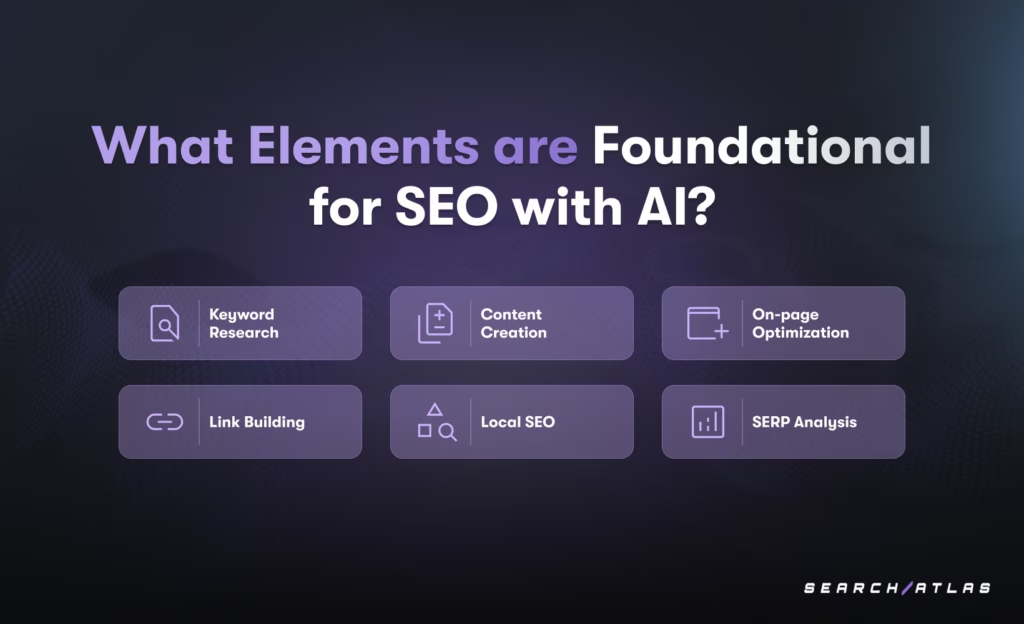
The elements that are foundational for SEO with AI are keyword research, content creation, on-page optimization, link building, local SEO, and SERP analysis.
AI SEO marketing relies on optimizing these core areas to automate search optimization tasks, scale website growth, and match algorithmic ranking signals.
The foundational elements for SEO with AI are listed below.
- Keyword Research
Keyword research is the process of identifying search terms that users enter into search engines to find information, products, or services.
AI improves keyword research by processing large-scale query data, detecting user intent patterns, clustering related topics, and predicting future search trends. AI SEO tools analyze SERPs (Search Engine Results Pages) in real-time, group keywords based on semantic relevance, and surface hidden opportunities in keyword research that traditional methods overlook.
AI SEO marketing tools help teams discover long-tail keywords, prioritize topics by competition and traffic potential, and organize keyword clusters into content architectures for better topical coverage.
- Content Creation
Content creation is the process of producing written, visual, or multimedia materials that inform, engage, and satisfy search intent.
Using AI for SEO content creation accelerates topic research, generates outlines aligned with SERP trends, and drafts human-readable articles that integrate primary and secondary keywords.
AI SEO marketing platforms assist in optimizing structure, ensuring semantic coverage, and maintaining tone consistency across large-scale SEO content production. Advanced models predict content gaps, suggest internal links, and simulate user engagement patterns to guide edits for higher ranking potential.
- On-page Optimization
On-page optimization is the practice of refining individual web pages to improve their search engine rankings and user experience.
Using AI for SEO on-page optimization supports real-time analysis of title tags, meta descriptions, headers, schema markup, internal linking, and content relevance.
AI SEO tools automatically detect structural gaps, semantic inconsistencies, and missing entities that affect page ranking. They suggest precise on-page SEO edits based on top-performing SERP competitors and adapt recommendations to match algorithm patterns for search intent satisfaction.
- Link Building
Link building is the process of acquiring hyperlinks from other websites to improve a site’s authority and search rankings.
Using AI for SEO link building enhances prospecting, anchor text optimization, backlink quality assessment, and opportunity prediction.
AI SEO platforms analyze backlink profiles, identify authority gaps, and generate target lists based on domain relevance, trust signals, and topical match. Some link building tools automate outreach personalization and campaign tracking, which helps teams prioritize links that contribute to higher Domain Power (DP) and topical authority consolidation.
- Local SEO
Local SEO is the optimization of a website or business profile to increase visibility for geographically relevant searches.
Using AI for SEO local optimization improves listing accuracy, review management, geo-targeted keyword clustering, and localized content creation.
AI tools audit Google Business Profiles (GBP), monitor local ranking changes, suggest proximity-based keyword opportunities, and automate customer review replies to boost engagement signals. Local SEO AI solutions help businesses dominate map packs, outrank local competitors, and adapt faster to searcher intent in specific service areas.
- SERP Analysis
SERP analysis is the process of examining search engine results pages (SERPs) to understand how and why certain pages rank for a specific query. SERP analysis involves reviewing ranking pages, featured snippets, People Also Ask sections, site diversity, domain authority, and content structure to evaluate competition and uncover ranking opportunities.
AI improves SERP analysis by automating the collection, comparison, and interpretation of search result data across thousands of keywords. AI SEO platforms apply machine learning (ML) and natural language processing (NLP) to cluster SERP patterns, detect entity gaps, score content against competitors, and predict which ranking factors are most influential for a given query set.
Tools powered by AI surface insights like topical coverage gaps, SERP volatility, emerging ranking features, and schema usage trends much faster than manual analysis.
AI-driven SERP analysis strengthens SEO strategy by turning live search behavior into actionable optimization opportunities, which help websites align more precisely with algorithmic expectations.
What Businesses Need AI SEO Software the Most?
Businesses that need AI SEO software the most manage large-scale websites, fast-changing inventories, or multi-location operations. AI-based SEO tools automate repetitive tasks, uncover ranking patterns faster, and adapt strategies based on real-time algorithm signals, making them essential for scaling SEO execution without manual bottlenecks.
The types of businesses that need automated SEO tools are listed below.
- Real Estate Companies. Real estate businesses operate dozens or hundreds of localized listings that require continuous SEO updates. AI SEO automation software helps real estate teams optimize property pages, manage local SEO, and generate location-based content without manual labor.
- E-commerce Brands. Ecommerce businesses manage extensive product catalogs that must be SEO-optimized across categories, collections, and SKUs. AI-based SEO tools handle bulk optimizations, dynamic meta generation, faceted navigation issues, and structured data updates critical for e-commerce SEO success.
- SaaS Companies. SaaS companies compete in highly dynamic search environments where user intent shifts quickly. SEO automation platforms accelerate topical content creation, keyword clustering, and technical improvements that keep SaaS websites aligned with evolving queries and competitive SERPs.
- Content Creators and Copywriters. Solo creators, bloggers, and content marketers use AI SEO software to streamline keyword research, optimize articles for semantic coverage, and boost content velocity without sacrificing quality or search relevance.
- Enterprises. Large organizations with complex site structures and global footprints use automated SEO tools to manage technical SEO, large-scale content updates, internal linking, and SERP monitoring across multiple brands or regions. AI SEO software like Search Atlas Enterprise SEO helps large companies grow their website traffic with all the tools they might need gathered in one place.
- Local Businesses. Multi-location businesses and local service providers depend on AI SEO solutions to manage Google Business Profiles, local citations, reviews, and localized content campaigns across markets.
- Startups. New businesses with limited resources use AI SEO to compete with established competitors by identifying high-opportunity keywords and content gaps.
Is it Worth it to Specialize in AI SEO Services?
Yes, it is worth it to specialize in AI SEO services. Businesses increasingly invest in AI SEO consultants and AI SEO agencies to automate keyword research, content optimization, technical SEO, and SERP analysis. Demand is growing across real estate, ecommerce, SaaS, and local businesses that need faster, scalable results.
Specializing in AI SEO consulting allows agencies to charge higher retainers, manage more clients through SEO automation software, and build a competitive advantage in entity-based and semantic SEO.
For service providers considering specialization, AI SEO represents a high-value niche with substantial growth potential and limited competition at the expert level. Search Atlas White Label SEO gives agencies an opportunity to offer AI-powered optimization services under their own brand, allowing specialization without developing proprietary technology.
What are the Top AI SEO Statistics?
The top AI SEO statistics highlight how artificial intelligence reshapes search optimization today. The top AI SEO statistics are listed below.
- 86% of SEO professionals have integrated AI into their strategy, according to SeoProfy.
- 67% of SEO experts believe the key benefit of generative AI is automating repetitive tasks, according to SeoProfy.
- 65% of businesses noticed better SEO results with the help of AI, according to SeoProfy.
- 75% of marketers use AI to reduce time spent on manual tasks like keyword research and meta-tag optimization, according to SeoProfy.
- 35% of companies apply AI to create SEO-driven content strategies, according to SeoProfy.
- 52% of SEO professionals improved on-page SEO performance using AI, according to SeoProfy.
- AI automates 44.1% of SEO tasks, including content creation and keyword research, according to Influencer Marketing Hub.
- AI tools improved SEO rankings by 49.2% after Google algorithm updates, according to Influencer Marketing Hub.
- 17% of SEO users save over 10 hours per week by automating repetitive tasks, according to Influencer Marketing Hub.
- 25.4% of users believe AI-generated content now outperforms human-written content, according to Influencer Marketing Hub.
Is AI Content Bad for SEO?
No, AI content is not inherently bad for SEO if it meets Google’s quality standards.
Google’s official guidance, updated in 2023, confirms that how content is produced matters less than what it provides to users. AI-generated content that is original, helpful, trustworthy, and aligned with search intent can rank well. Content originality plays a critical role in AI SEO because duplicate, low-value, or spammy AI content is penalized under Google’s E-E-A-T (Experience, Expertise, Authoritativeness, Trustworthiness) framework.
In short, Google’s new policy emphasizes that AI content for SEO must demonstrate real human value, even if it is AI-assisted. Thin, automatically generated pages designed just for rankings violate guidelines. But AI-assisted articles that solve user problems, offer unique insights, and enhance topical depth are treated the same as human-written content.
When using AI SEO content strategies, prioritize original research, unique examples, structured information gain, and manual editing to ensure it supports long-term rankings.
What to Know About AI SEO Besides E-E-A-T Principles?
AI SEO must operate within the framework of E-E-A-T (Experience, Expertise, Authoritativeness, Trustworthiness) to achieve sustainable rankings.
Google’s evaluation systems prioritize content that shows real-world expertise, personal experience, and verified trust signals, regardless of whether humans or AI generate the text. Google’s evaluation system makes E-E-A-T principles critical for AI SEO because algorithms now assess not just keyword relevance, but the depth, accuracy, transparency, and real-world credibility of the information.
For AI-generated SEO content to succeed, businesses must attribute insights to qualified sources, demonstrate firsthand experience, build topical authority through structured content, and back claims with verifiable evidence. AI SEO strategies that ignore E-E-A-T risk being downgraded, especially after algorithm updates like the Helpful Content Update and Core Updates of 2023–2025.
Is SEO Dead with AI?
No, SEO is not dead with AI. SEO is evolving into a more automated and precision-driven discipline.
AI has transformed traditional SEO tasks such as keyword research, content optimization, and technical audits into faster, data-backed workflows. However, AI SEO still depends on understanding human search behavior, satisfying real user intent, and structuring websites according to algorithmic patterns.
Automated AI SEO enhances scalability, but it does not replace the need for strategy, brand authority, and E-E-A-T compliance. Businesses that integrate AI tools while maintaining original expertise, topical depth, and transparent site structures continue to rank and grow, which proves that SEO remains critical in an AI-driven search environment.
How Will AI Change SEO?
AI is revolutionizing SEO by providing tools that offer deeper insights, faster execution, and more precise targeting across every stage of website optimization.
AI SEO software automates technical audits, predicts ranking patterns, clusters keywords by intent, and generates content based on entity relationships instead of keyword stuffing. Machine learning models identify behavior signals like click-through rates and dwell time to optimize user experience in real-time.
While AI will replace many repetitive SEO tasks, it will not eliminate the need for SEO writers, strategists, or technical professionals. Instead, SEO roles will shift toward auditing AI outputs, managing topical authority, and designing optimization strategies that machines alone cannot master.
Automated SEO software scales execution, but human expertise still drives ranking longevity and brand authority in search.
What are the Key Differences between Traditional SEO and AI-driven SEO?
AI-driven SEO uses machine learning models to automate optimizations and predict ranking behavior, while traditional SEO relies on manual updates based on historical best practices.
The goal of AI SEO is to accelerate workflows, improve targeting precision, and adapt content dynamically based on real-time search signals. Traditional SEO aims to optimize rankings through hand-crafted keyword research, manual technical audits, and link-building campaigns.
For example, AI SEO platforms like Search Atlas automatically cluster topics and score drafts based on search engine guidelines, while traditional SEO specialists create keyword lists and editorial calendars manually.
What is the Relation Between AI SEO and Generative Engine Optimization (GEO)?
AI SEO and Generative Engine Optimization (GEO) are closely connected because both focus on adapting content for AI-driven search systems that prioritize user satisfaction and entity relevance over keyword matching.
AI SEO platforms create semantically rich content aligned with entity relationships, while GEO practices refine that approach to specifically optimize SEO for AI search engines like Google SGE or Bing Copilot. In the future, Generative Engine Optimization will require AI-enhanced workflows that match queries and anticipate variations with surface-level answers across AI-powered search assistants.
What is the Relation Between AI SEO and Programmatic SEO?
AI SEO and Programmatic SEO intersect because both use automation to optimize large volumes of content and technical assets, but they differ in their level of semantic sophistication.
While programmatic SEO focuses on scaling thousands of templated pages using structured datasets and URL patterns, usually for ecommerce or SaaS sites, AI SEO adds another layer by enhancing the semantic quality of these pages, predicting searcher behavior, and optimizing content structure dynamically based on live SERP signals.
What is the Relation between AI SEO and Semantic SEO?
AI SEO and Semantic SEO are directly connected because AI tools rely on semantic analysis to interpret user intent, topic relevance, and entity relationships instead of simple keyword frequency.
AI SEO systems operationalize semantic SEO by mapping entity graphs, clustering related topics, and ensuring content covers the necessary depth and breadth for ranking dominance. Semantic SEO builds website authority by covering a topic comprehensively across informational, navigational, and transactional intents.


